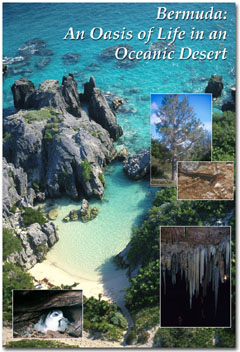 |
Bermuda: An Oasis of Life in an Oceanic Desert
The isolated island chain of Bermuda is located in the western North Atlantic 965 km east of Cape Hatteras, USA. With a total land area of just 55 km², the UK's oldest Overseas Territory comprises over 150 limestone islands that sit on the largest of three volcanic seamounts formed about 110 million years ago. Influenced by the warm waters of the Gulf Stream, Bermuda's shallow-water platform covers an area of about 1000 km², and supports the northernmost coral reef system in the world.
Despite a long history of conservation, the Island’s conservation agencies are faced with a challenge. Bermuda’s low-rolling hills are largely suburban in character, supporting a resident population of over 60,000 concentrated on the 7 largest islands. Economic growth, based on tourism and international business, attracts 500,000 visitors each year. The pressure for development, coupled with the ever-increasing problem of introduced species, pose an escalating threat to the fragile ecology of the Island.
Organisations such as the Bermuda Audubon Society and Bermuda National Trust have focused on the acquisition, restoration and management of critical habitats, most notably wetlands, as well as conservation advocacy. The Bermuda Zoological Society meanwhile has concentrated on promoting environmental education and community participation in in-situ research and conservation activities. All work closely with the Bermuda Government's Conservation Services Department.
|
 |
|
|
 |
| click images for larger versions |
| About 250 of over 8,000 plant and animal species known from Bermuda are unique. Many of these are found in the extensive network of submerged caves (inset) and, like the fabled cahow and Bermuda skink (pictured), are critically endangered. Others, such as the Bermuda cedar (pictured), nearly wiped out in the 1940s by an introduced scale insect, are more common, due to island-wide planting schemes. |
| Photographs courtesy of Bermuda Govt. Information Services; Stephen Bainbridge; Richard Ground; Martin Thomas |
|
 |
|














